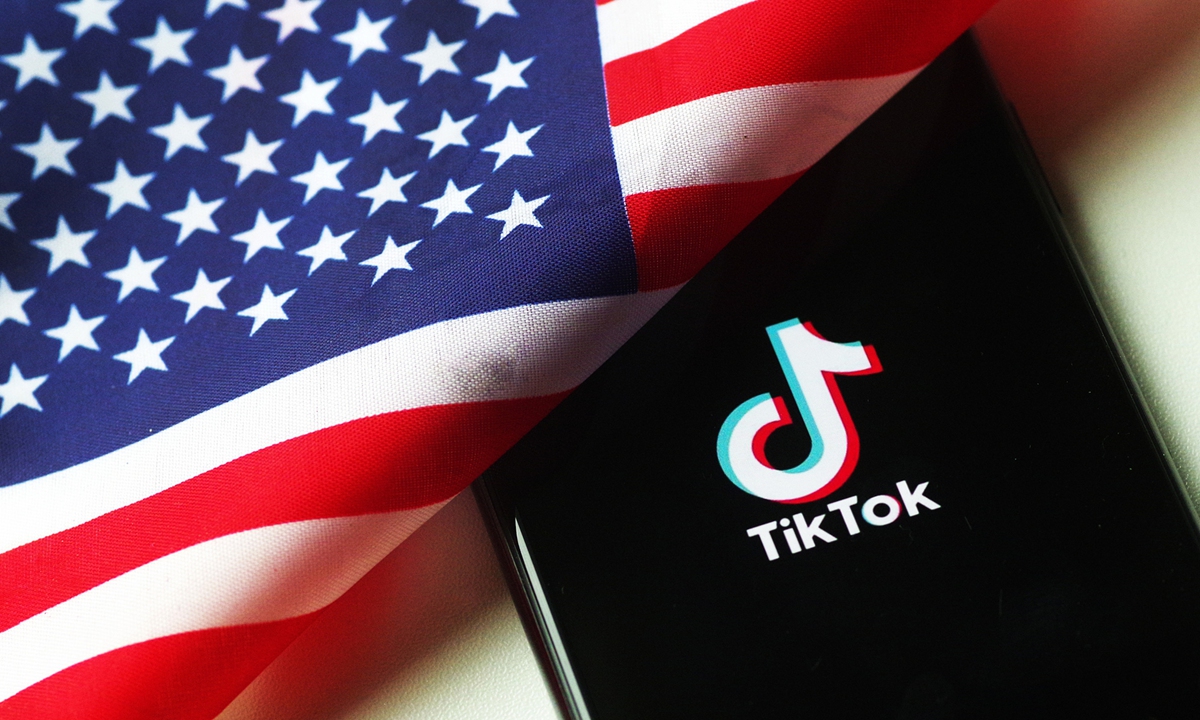China will prevent US TikTok ‘takeover’
By Ma Jingjing and Shen Weiduo Source: Global Times Published: 2020/9/28 0:33:40
US hearing won’t make any significant difference: observers

TikTok US Photo: VCG
China will resolutely take actions to prevent TikTok and its technologies from falling into the US' hands to protect its national security and the interests of its enterprises, experts said on Sunday, as a hearing continues as of press time in the US over whether the US government's TikTok ban will be halted.
The popular video-sharing app will be removed from the Apple and Google app stores from 11:59 pm Sunday (US time) unless federal judge Carl Nichols, who was chairing an emergency court hearing, decides to halt the ban.
The court's ruling on Sunday won't actually make a significant difference as the Trump administration will undoubtedly continue its push for a full ban of TikTok in the US, experts said.
US President Donald Trump initially signed an executive order imposing a November 12 deadline for ByteDance to sell or "spin off" TikTok's operations in the US on national security grounds.
After a tentative deal was revealed between ByteDance and US multinational tech firm Oracle forming a business partnership, the US Justice Department moved to add pressure on the Chinese firm by claiming on Friday that ByteDance founder Zhang Yiming is "a mouthpiece" of the Communist Party of China and the firm's close relationship with Chinese authorities endangers American citizens' security.
All of the capricious actions taken by the Trump administration against TikTok aim to contain China and the country's world-class companies, experts said, stressing that China will resolutely fight back to safeguard the interests of its enterprises while preventing the US' hegemonic mind-set.
Dangerous precedent
Whatever the final result for the TikTok's US business, the US' misdeeds have set a dangerous precedent for other countries, said Liu Dingding, a veteran industry analyst and close follower of the TikTok issue.
A tentative deal recently unveiled made US multinational tech firm Oracle a trusted partner and shareholder in a new entity in the US known as TikTok Global, in which the Chinese firm would reportedly maintain majority ownership and won't transfer its algorithm to US companies.
"If the US-manipulated restructuring of TikTok becomes a template [for future deals], it would mean that world-class companies that have core competitiveness would be like 'lambs' that can be wantonly slaughtered by the US government when they enter the US market," Liu said.
China won't "bend over" to the US' aggression, however, because if it did so, other countries might follow the US' lead and push Chinese firms with the same excuses, and they may even go further than the US did, said Zuo Xiaodong, vice president of the China Information Security Research Institute.
"The Trump administration is so crazy that it considers any Chinese firm that collects user data in normal business operations as a [national security] threat. According to the US' hegemonic logic, China should have banned a number of US high-tech companies as China heavily purchased from the US for its information industry development over the past years," Zuo said.
In a move to protect its own interests and security, China in August added algorithms to its export control list for the first time. On September 19, the country also issued provisions for its long-awaited first "unreliable entity list," aiming to penalize foreign entities and individuals that undermine China's national interests and Chinese firms' legitimate rights.
At a time when most countries are concerned about the security of user data, large economies like the US should lead the development of internationally recognized data collection and use standards to benefit the long-term development of the information industry rather than targeting certain powerful companies, Zuo said.
Enlarging woes
From France's Alstom and Japan's Toshiba to China's ZTE, Huawei and TikTok and WeChat, foreign enterprises have been bullied by the US time and time again.
Reuters reported that the US has imposed fresh restrictions on exports to China's biggest chipmaker, Semiconductor Manufacturing International Corp (SMIC), after concluding there is an "unacceptable risk" that the equipment supplied to the firm could be used for military purposes, citing a letter from the US Commerce Department dated Friday.
Although the US Department of Commerce has not yet publicly posted the document, analysts said the reported move is highly possible and could be "catastrophic," as it not only deals a heavy blow to the Chinese chipmaker, but will also strangle the "root and base" of the country's high-tech sector.
In a statement sent to the Global Times on Saturday, SMIC said that it has not received any official notification about potential US sanctions, reiterating that SMIC only provides products and services for civilian and commercial end-users. "SMIC has no relationship with the Chinese military and does not manufacture products for military users," reads the statement.
If SMIC is restricted as reported, most of its business operations will be frozen as the company cooperates with US partners across its entire industrial chain. For example, SMIC buys chips for terminals from Qualcomm, said analysts.
"The US 'chip cut' on Huawei has already acted as a 'wake-up' call to China's high-tech sector, and the move on SMIC will only accelerate the company's efforts to become self-reliant," said Jiang Junmu, chief writer at Chinese telecom industry news website c114.com.cn on Sunday.
The whole country — from the policymakers to industry players — may now need to find an effective way to grow a completely self-reliant chip industrial chain, even if it means huge losses in the short term, according to experts.
Chinese firms should ignore the "tricks" Trump will most likely play ahead of the US presidential election, Liu said, noting that they should maintain their own pace and invest in homegrown technology to cope with the US' maximum crackdown.
Posted in: DIPLOMACY